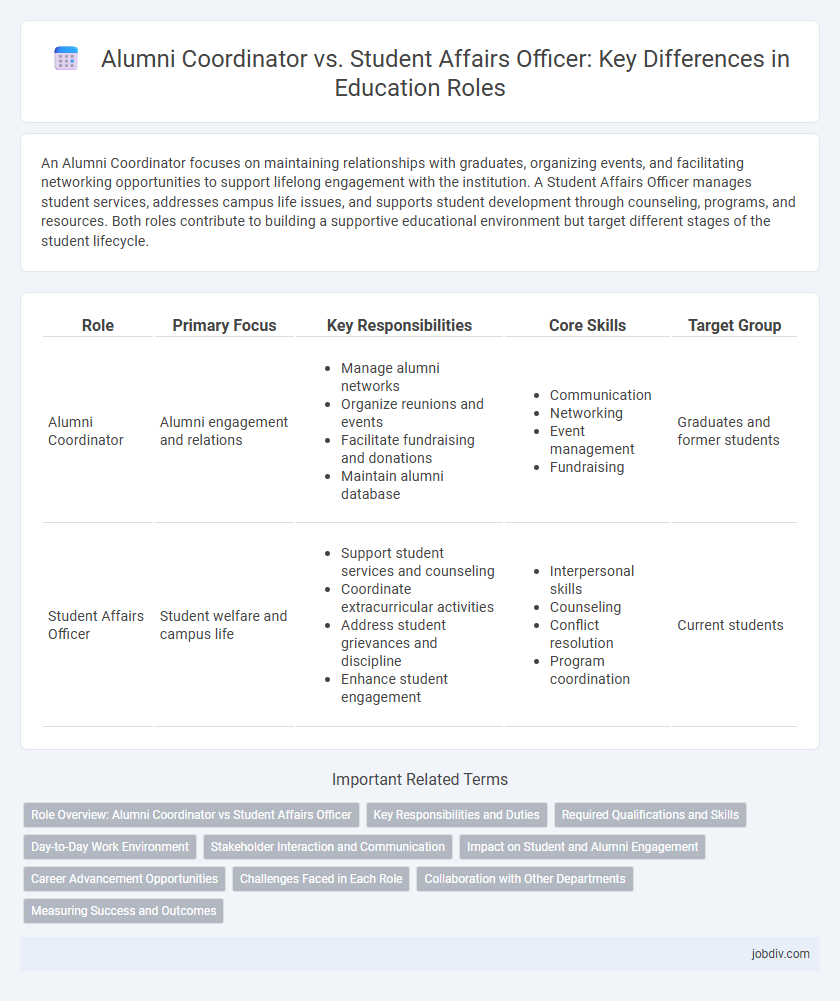An Alumni Coordinator focuses on maintaining relationships with graduates, organizing events, and facilitating networking opportunities to support lifelong engagement with the institution. A Student Affairs Officer manages student services, addresses campus life issues, and supports student development through counseling, programs, and resources. Both roles contribute to building a supportive educational environment but target different stages of the student lifecycle.
Table of Comparison
| Role | Primary Focus | Key Responsibilities | Core Skills | Target Group |
|---|---|---|---|---|
| Alumni Coordinator | Alumni engagement and relations |
|
|
Graduates and former students |
| Student Affairs Officer | Student welfare and campus life |
|
|
Current students |
Role Overview: Alumni Coordinator vs Student Affairs Officer
An Alumni Coordinator manages relationships with graduates, organizing events, and maintaining engagement to support institutional advancement and fundraising efforts. A Student Affairs Officer focuses on enhancing the student experience by addressing academic, social, and personal development needs through counseling, program development, and student support services. Both roles contribute to a university's community but target different populations and objectives within education administration.
Key Responsibilities and Duties
An Alumni Coordinator manages post-graduation engagement, focusing on cultivating relationships, organizing events, and facilitating networking opportunities for former students to support institutional growth. A Student Affairs Officer handles on-campus student support services, addressing student welfare, coordinating extracurricular activities, and managing counseling or conflict resolution to enhance the overall student experience. Both roles require strong communication and organizational skills but target distinct phases of the student lifecycle and engagement priorities.
Required Qualifications and Skills
An Alumni Coordinator requires strong communication and networking skills to maintain relationships with graduates, along with a degree in communications, marketing, or related fields. In contrast, a Student Affairs Officer typically needs expertise in counseling, student development, and conflict resolution, supported by a degree in education, psychology, or social work. Both roles demand organizational skills and proficiency in event planning, but the Alumni Coordinator focuses more on external engagement while the Student Affairs Officer emphasizes on-campus student support.
Day-to-Day Work Environment
An Alumni Coordinator manages communications and engagement with graduates, organizing events and maintaining alumni networks primarily through remote or office settings. A Student Affairs Officer operates on campus, directly interacting with students to support their academic and social needs, often involving frequent face-to-face meetings and event coordination. Both roles require strong organizational and interpersonal skills but differ in daily interactions and work locations.
Stakeholder Interaction and Communication
Alumni Coordinators engage primarily with former students to maintain ongoing relationships, organize events, and facilitate networking opportunities, requiring strong communication skills tailored to alumni needs. Student Affairs Officers communicate regularly with current students, faculty, and campus organizations to address student concerns, coordinate programs, and support campus life, necessitating proactive stakeholder engagement and conflict resolution abilities. Both roles demand effective interpersonal communication but differ in their primary stakeholder groups and interaction focus within educational institutions.
Impact on Student and Alumni Engagement
Alumni Coordinators enhance student and alumni engagement by organizing networking events, facilitating mentorship programs, and maintaining lifelong connections that benefit career development. Student Affairs Officers impact engagement by supporting student well-being, fostering inclusive campus environments, and promoting involvement in extracurricular activities that build leadership and community skills. Both roles complement each other, with Alumni Coordinators focusing on long-term relationships and Student Affairs Officers driving immediate campus involvement.
Career Advancement Opportunities
Alumni Coordinators specialize in fostering long-term relationships with graduates, enhancing networking platforms that can significantly boost career advancement opportunities through alumni connections and mentorship programs. Student Affairs Officers focus on supporting current students' personal and professional development by organizing career workshops, internships, and counseling services that directly impact employability and skill-building. Both roles contribute uniquely to career growth, with Alumni Coordinators emphasizing post-graduation networking and Student Affairs Officers prioritizing immediate student success and preparation for the job market.
Challenges Faced in Each Role
Alumni Coordinators often face challenges in maintaining long-term engagement and fostering meaningful connections with a diverse and geographically dispersed alumni network. Student Affairs Officers encounter difficulties managing the mental health and well-being of students while balancing administrative responsibilities and campus safety concerns. Both roles require adept communication skills and adaptability to address evolving educational landscapes and stakeholder needs.
Collaboration with Other Departments
Alumni Coordinators frequently collaborate with Development and Communications departments to maintain strong alumni networks and coordinate fundraising events. Student Affairs Officers work closely with Academic Affairs, Counseling, and Residence Life to support student well-being and academic integration. Both roles require interdisciplinary cooperation to enhance institutional engagement and student success outcomes.
Measuring Success and Outcomes
Alumni Coordinators measure success by tracking alumni engagement metrics, event attendance, and fundraising outcomes to strengthen long-term institutional support. Student Affairs Officers assess their impact through student retention rates, satisfaction surveys, and participation in campus programs, reflecting immediate student development and campus climate. Both roles utilize data analytics and feedback mechanisms to optimize their strategies and enhance educational support services.
Alumni Coordinator vs Student Affairs Officer Infographic

 jobdiv.com
jobdiv.com